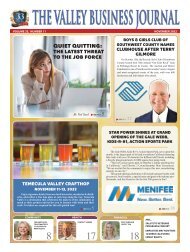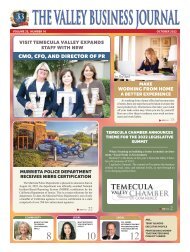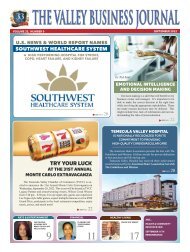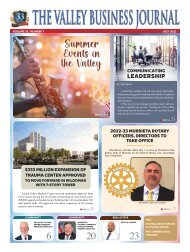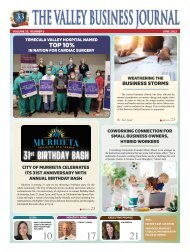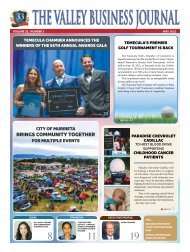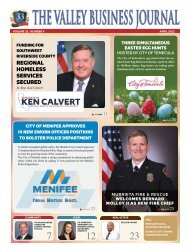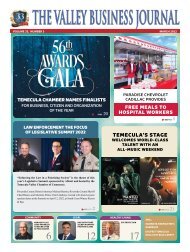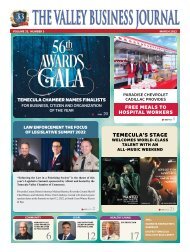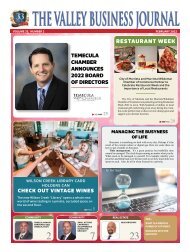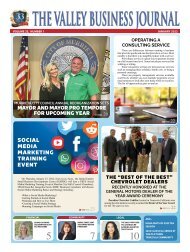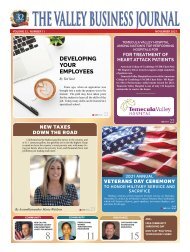March 2016
Create successful ePaper yourself
Turn your PDF publications into a flip-book with our unique Google optimized e-Paper software.
THE VALLEY BUSINESS JOURNAL<br />
30 www.TheValleyBusinessJournal.com<br />
<strong>March</strong> <strong>2016</strong><br />
“Books are the training weights of the mind.”<br />
-Epictetu<br />
“My best friend is a person who will give me<br />
a book I have not read.”<br />
~Abraham Lincoln<br />
sA book is a device to ignite the imagination.”<br />
~Alan Bennett<br />
Book Review<br />
“How to Think Like Einstein”<br />
by Scott Thorpe<br />
Right in front of your<br />
nose.<br />
That’s where you usually<br />
find the solution to sticky<br />
problems: always right there,<br />
where you weren’t necessarily looking.<br />
This time, though, there’s no<br />
easy answer, no matter how much<br />
you ponder and pick but if you read<br />
the new book “How to Think Like<br />
Einstein” by Scott Thorpe, you<br />
could become a genius at things<br />
like this.<br />
Ever since revealing his Theory<br />
of Relativity in 1905, Albert<br />
Einstein’s held a special place in<br />
science, history, and culture. E =<br />
mc2 and Einstein = genius.<br />
That was true in the early<br />
years of Einstein’s career: fresh<br />
out of university, he was alight<br />
with “truly revolutionary thinking”<br />
but, alas, the fire waned<br />
as he got older. “He was still<br />
brilliant,” says Thorpe, but Einstein<br />
didn’t do the kind of work he did<br />
when he was a lad. Thorpe blames<br />
Einstein’s growing knowledge and<br />
his decreasing willingness to “break<br />
the rules.”<br />
And that, Thorpe says, is what<br />
made Einstein so darn smart: he<br />
was happy to ignore conventional<br />
wisdom and get out of “rule ruts.”<br />
Though we are trained to heed rules<br />
in life and in work, breaking them, he<br />
claims, is the “universal principle”<br />
for thinking like a genius.<br />
Wrestling with the unsolvable<br />
starts with writing the problem as a<br />
statement that “focuses your mind.”<br />
Identify why you want the problem<br />
solved and what you’ve already tried<br />
to do. What are the “rules” that might<br />
govern this issue?<br />
Once you’ve identified the problem,<br />
“create a better one” by “resizing”<br />
the conundrum, making it<br />
simpler, and changing your attitude<br />
towards it. Try to look at it differently,<br />
then write it down again.<br />
Journal your ideas, and remember<br />
that there are no “bad ideas”<br />
when problem-solving. Learn methods<br />
to escape those irksome rule ruts.<br />
Know how to bust rules and “ignore<br />
inconvenient facts.” And finally,<br />
keep in mind that “Mistakes are<br />
essential to growing ideas.” Don’t<br />
make them on purpose but don’t<br />
discount them, either.<br />
Sometimes, it’s too easy to get<br />
too close to a problem, which makes<br />
it impossible to get past the issue. “How<br />
to Think Like Einstein” might help. And<br />
then again, it might not.<br />
I thought it odd that author Scott<br />
Thorpe puts the gist of his entire book<br />
on the bottom of the very first page:<br />
“…you’ve got to break the rules.” You<br />
know everything you need to know right<br />
there; what follows is just enhancement<br />
for those six words. It also struck me<br />
that problem-solving often doesn’t have<br />
the luxury of time, of which Thorpe’s<br />
process demands a fair amount.<br />
Readers do receive a nicely-varied,<br />
well-researched wealth of interesting<br />
illustrative anecdotes, but they were<br />
more entertaining than helpful in the<br />
immediate raison d’être of this book.<br />
I think there’s goodness here – in<br />
particular, an entire chapter of group<br />
exercises for breaking out of the “rule<br />
ruts” - but past that, help is going to take<br />
some serious digging.<br />
Indeed, the solutions you’ll find in<br />
“How to Think Like Einstein” are not as<br />
plain as the nose on your face.<br />
Though we are trained to<br />
heed rules in life and in work,<br />
breaking them, he claims, is the<br />
“universal principle” for thinking<br />
like a genius<br />
©2015, Sourcebooks $16.99 / $22.99 Canada 272 pages




